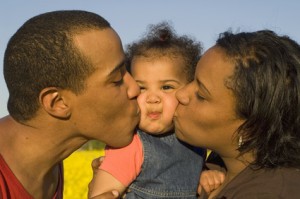What Spit Teaches Toddlers About a Safe Home
One of the most important skills a baby or toddler must learn is how social relationships work—who is reliable, who helps who, who can be trusted. A study from MIT identified a signal babies and toddlers use to determine if two people have a strong relationship and a commitment to help and support one another. The signal? Sharing saliva (yep…spit). They seem to observe shared saliva through activities like kissing, sharing food, or drinking from a common glass.
In this study researchers observed toddlers (16.5- to 18.5-months-old) and babies (8.5- to 10-months-old) respond to interactions between puppets and people in two different experiments. In the first experiment, the puppet shared an orange with one person and played catch (tossed a ball back and forth) with a second person. The crux of the experiment came afterward when the puppet “experienced distress.” Which person would the observing toddler look to in expectation of that person helping the distressed puppet? You guessed it. The one who shared food (an orange) with the puppet.
In the second experiment, a person placed her finger in her mouth and then into the mouth of the puppet (I know…gross). With a second puppet, the person touched her forehead and then touched the puppet’s forehead. Guess which puppet the child expected to help the person when she became distressed. The one who shared saliva by putting a finger in her mouth and the puppet’s mouth (still gross). In other words, babies and toddler seem to assume that people who share saliva by sharing food, sharing cups, kissing, or, apparently, sucking a common finger will come to one another’s assistance during times of stress. (See a video talking about the study here.)
So what? Good question. Babies and toddler thrive when they reside in an environment which they perceive as safe, an environment in which people have strong relationships and a mutual desire to help one another. Apparently, a toddler sees this sign of safety by observing the sharing of saliva among family members. Of course, that does NOT mean you have to start spitting around the house to make your child feel safe. Instead, you can help your toddler experience your home as a safe, trusting environment with some simple, innocent actions in which you might share saliva (I know it’s gross sounding but…). For instance,
- Let them see you and your spouse share a simple kiss when one of you leaves the house and again when you reunite. (This will also strengthen your marriage.) A good night kiss for your spouse and your toddler will communicate a trusting relationship with both.
- Sharing simple foods like orange pieces or ice cream with family members will communicate a strong relationship to your toddler as well. And a strong relationship among family members translates into an increased sense of safety. Plus, sharing will increase overall family trust.
- Lick the bowl together after making cookies or icing. Your baby may even lick the treat right off your own finger…which you probably used to put icing in your mouth as well. (I know, it’s gross, but we’ve all done it…and it actually increases your toddler’s sense of safety and trust!)
Overall, sharing food, drinks, and kisses does more than potentially share saliva, doesn’t it? It represents a trust in the person with whom you share. Your toddler will pick up on that trust…and that will increase their sense of safety in your home. I have to say it (gross as it is): Give your child a sense of security in your home, share some saliva.

-0 Comment-